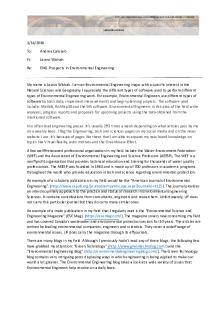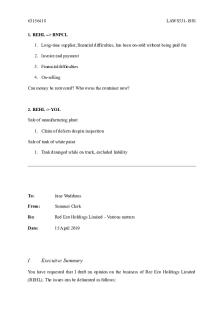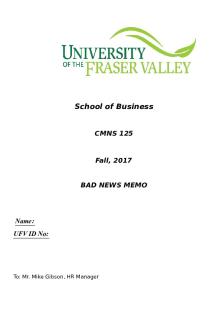TWC Assignment Memo 2 and Memo 4 PDF

| Title | TWC Assignment Memo 2 and Memo 4 |
|---|---|
| Course | Business Policy |
| Institution | College of Staten Island CUNY |
| Pages | 4 |
| File Size | 88.7 KB |
| File Type | |
| Total Downloads | 74 |
| Total Views | 156 |
Summary
TWC Assignment Memo 2 and Memo 4...
Description
TWC Assignment Memo 2 and Memo 4
As a team of executive board members, you are meeting to discuss key economic problems faced by the company and to find rational solutions. It is based on the timeless case study in business strategy of Time Warner Cable, which follows Chapter 14 of the textbook. The case allows you to apply core elements from managerial economics to a remarkably rich business environment. You need to identify key issues, present your analysis, make and defend your recommendations and decisions. Consider this a practice run for the real business world. In this discussion, please focus on Memo 2 and Memo 4 (included in the textbook), with additional attachments posted in Moodle below this DF to address the highlighted problems and questions in these selected Memos for this meeting. Some more research is recommended with relevant referencing, supporting evidence, and data. The discussions are planned to be an exchange of opinions between students supported with theory and economic models, involving posts and replies to posts. It is great when everyone adds some more, expands the topic, adds new perspective. Therefore, you need to start asap to produce a lively discussion before the deadline with a solution reached as a team.
Time warner cable is a massive company that with Time Warner operating in five huge geographic areas being New York, Southern California, Texas, the Midwest and the Carolinas they serve about 16 million residents. (Baye, 2017, Page 471) With Hulu and Netflix on the rise more people are opting to switching to those services then having cable. TWC should be concerned with Google’s YouTube entering the competition because they are offering deals with no commercials. Having services such as YouTube Red, Netflix and Hulu is convenient because I can watch it on the go on all my devices and I don’t pay much for my subscriptions. Whereas cable can be pricey when you add on special TV Channels and EPIX. TWC will always get money for providing internet because to have Netflix and Hulu you need internet. TWC needs to start offering premium channels for free and not overcharge for direct access because it will affect their business severely. With so much out there now, customers have options and are smart where they put their money.
What a great point on needing internet for those two platforms. I myself am a huge user of both but I do realize without my internet provider I couldn’t even access them. At least 77 percent of households in the United States have at least one HDTV and about 46 percent have more than one. (Baye, 2017, Page 471) This does allow TWC a competitive advantage over other companies with the dependency the other platforms have for them. Online traffic continues to grow which requires an increasing demand for high speed data and internet. (Baye,2017, Page 473)
Great job on your post! I agree with you that Time Warner has to worry about Netflix and Hulu. But I think they also have to worry about streaming devices like the Fire Stick, Roku Amazon Prime, and Chromecasts too. What do you think? All that a person would need is internet. So Time Warner does have Internet, but there are alot of other companies that have internet too. So I would think a customer would go with a company that has a great reputation with internet speed and great service along with a decent price. With Time Warner you have to pay for a modem, wifi box and the service so your charges just keep going up. Online traffic will continue to grow, so that means an increasing demand for high speed data and internet. (Baye, 2017). Plus did you hear about how Spectrum wasn't giving customers the correct speed they were paying for and had to reimburse a bunch of people up to $150. With that being said how could people trust Spectrum after that I sure dont and I switched to Fios. I do have Netflix and Hulu too and a fire stick and Chromecast too, plus cable guess I just like having options. I think more people will just go with an internet service over cable. What do you think? Keep up the great work.
Yes! Streaming devices such as Fire Stick, are definitely TWC competitors just as much Netflix and Hulu. Internet is a huge part of my life and I need it more then cable. There are ways to get around paying the modem from TWC and other companies and that is to just buy your own modem, which you only pay for once, and they send a technician that connects it to the service. Having options is great when it comes to streaming or watching cable but it all comes down to my pockets if I can afford it.
1.
To add to your post, Time Warner Cable now Spectrum, apparently has come to the conclusion there's no turning back the consumer explosion in cord-cutting and streaming television the cable television giant is making a play to lure traditional cable defectors with a cutrate Internet cable television package. Spectrum's streaming app looks a bit like traditional cable when it's opened and also is similar to other streaming apps such as Sling TV. Spectrum internet is required for the new streaming subscription.
"Evidence of the erosion can be seen in ESPN subscriber losses. Once the giant of content providers for the cable companies, the sports network has lost an estimated 13 million subscribers over the past six years. Research by Verna's company indicates defections from cable providers will only increase in the coming years. Spectrum is marketing to the trend of disaffected cable customers increasingly converting to streaming for their television viewing. After the two-year introductory period, the Choice TV package price rises to $26.99; and $34.99 in year four."
This case study for Time Warner Cable (TWC) was in 2016 which was approximately a year prior to my seven tenure in their call center. By that point, they had already been acquired by Charter and re-branded as Spectrum. A question that many colleagues would ask in meetings was: "Is there really a use for cable anymore?" While it was true in 2016 (and still is today), streaming entities such as Netflix and Hulu did provide some alternatives to cable providers. However, they still require a broadband internet connection in order to stream properly. Furthermore, at the time of the case study, neither of the above-mentioned entities offered live broadcasting of TV shows. Simply put, in many markets, the only alternatives to cable for live programming were either via satellite services such as DirectTV or by accessing channels via an over the air (OTA) antenna. Therefore, if customers want to maintain the channel lineup of live broadcasts, TWC takes advantage of economies of scope as the cost of using one provider for cable and another for internet could be greater than if they purchased both of those as part of a bundle through TWC (Baye & Prince, 2017, pg. 164) TWC’s Vice President of Marketing seems to understand that the service with true concern for competition is in internet services (Baye & Prince, 2017, pg. 486) Google Fiber was on the rise in 2016. The advent of other fiber-optic providers such as Greenlight Networks would come father down the line. The fact that Charter Spectrum would offer their own services in this line of business indicate that they intend to compete in this internet market. In other words, there still was "...a use for cable". Opportunities for TWC lie in their ability to reduce to a competitive monthly rate and/or reduction of activation costs (which, from my experience as a customer and an agent, nonrefundable). When an individual product is not being produced at a sufficient level to reach economies of scale in distribution, another product can be used to share the same distribution channel. (T. Wheelan) TWC used this strategy to keep up or ahead of its competitors. One of the main goals of a firm is to create synergies between its business units. Synergy exists when the Return on Investment (ROI) for each business unit is greater that what it would be if it was treated as an independent business. It has been proven that Economies of Scope is a great strategy to help achieve synergy. (T. Wheelan) TWC achieved this with their internet service and cable TV programming service.
1.
Even as broadband Internet speeds increased by 48 percent from May 2014- May 2015, ISPs still ranked towards the bottom of consumer satisfaction surveys.This dissatisfaction exist even though US companies generally exceed their advertised speeds. Consumers also lament broadband prices, but when quality is actually considered, consumers have seen continual 5-7 percent declines in real price per year for their speed tier. Few other goods or services can match this decline.
"Time Warner Cable is officially taking its first steps toward eliminating the cable box, with streaming video trial launching in New York City and New Jersey. As rumored a couple weeks ago, the service starts at $10 per month for broadcast channels such ABC, CBS, NBC, and Fox, while a $20 per month plan tacks on Showtime or Starz. For $50, subscribers get 70 channels including ESPN, AMC, and Comedy Central. Instead of using a cable box, subscribers stream the video through Time Warner’s app on Roku, iOS, Android, Amazon Fire tablet, Xbox 360, Xbox One, and Samsung Smart TVs. In the trial program, subscribers can get a free Roku 3 for a limited time" (Newman 2015) In the fight to catch the client, organizations utilize a wide scope of strategies to avoid contenders. Progressively, cost is the weapon of decision—and as often as possible the skirmishing declines into a price war. Making low-value offer is frequently the objective, however the after effect of one retaliatory value slicing after another is regularly a steep decrease in industry benefits. As explained in the above example, with Google coming in, more and more people are now shifting to services that are being offered by Google. Sometime this can be either good or bad for a company depending on they want to go after said market. A few assessments recommend that the general misfortunes endured by the business that year surpass the joined benefits for the whole business from its initiation. Price wars can make financially destroying and mentally weakening circumstances that negatively affect an individual, an organization, and industry benefit. A company in this case can decide to cut its price, however, there can be many implications to this: 1.
An example of price slicing may instruct clients to envision lower costs; increasingly understanding clients will concede their buys until the following cost cut. 2. Second, a price cutting organization builds up a notoriety for being low-evaluated, and this notoriety may provide reason to feel ambiguous about the quality and picture of different items under the umbrella brand and on the nature of future items. 3. Third, price cuts have suggestions for different players in the market, whose personal circumstance might be hurt by lower costs....
Similar Free PDFs

TWC Assignment Memo 2 and Memo 4
- 4 Pages

Memo - Business Memo Assignment
- 2 Pages

Memo 1 - Memo 1 Assignment
- 2 Pages

Memo assignment
- 10 Pages

Memo - Memo
- 2 Pages

Email and Memo Assignment 2020
- 4 Pages

Memo - Memo for stocks
- 2 Pages

Topics Memo Assignment Sheet
- 1 Pages

Informative Memo Assignment
- 3 Pages

direct memo assignment
- 2 Pages

Laptop Memo - BIT-200 Memo
- 2 Pages

2 MEMO - Semester test
- 6 Pages
Popular Institutions
- Tinajero National High School - Annex
- Politeknik Caltex Riau
- Yokohama City University
- SGT University
- University of Al-Qadisiyah
- Divine Word College of Vigan
- Techniek College Rotterdam
- Universidade de Santiago
- Universiti Teknologi MARA Cawangan Johor Kampus Pasir Gudang
- Poltekkes Kemenkes Yogyakarta
- Baguio City National High School
- Colegio san marcos
- preparatoria uno
- Centro de Bachillerato Tecnológico Industrial y de Servicios No. 107
- Dalian Maritime University
- Quang Trung Secondary School
- Colegio Tecnológico en Informática
- Corporación Regional de Educación Superior
- Grupo CEDVA
- Dar Al Uloom University
- Centro de Estudios Preuniversitarios de la Universidad Nacional de Ingeniería
- 上智大学
- Aakash International School, Nuna Majara
- San Felipe Neri Catholic School
- Kang Chiao International School - New Taipei City
- Misamis Occidental National High School
- Institución Educativa Escuela Normal Juan Ladrilleros
- Kolehiyo ng Pantukan
- Batanes State College
- Instituto Continental
- Sekolah Menengah Kejuruan Kesehatan Kaltara (Tarakan)
- Colegio de La Inmaculada Concepcion - Cebu



